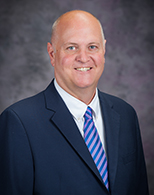Education professor co-author of national report on challenges of rural schools
Thursday, Nov. 14, 2019
MANHATTAN — A report detailing a 50-state comparison of rural schools reveals that many rural students face numerous inequities, and Kansas, like many other states, has both areas to celebrate and preserve as well as serious issues to address.
"Why Rural Matters 2018-19: The Time is Now" was published by the Rural School Community Trust in Washington, D.C. Jerry Johnson, chair of the educational leadership department and Lydia E. Skeen endowed professor in education at the Kansas State University College of Education, is one of the report's authors. The full report can be viewed at http://www.ruraledu.org/.
Nearly one-quarter — 111,000 — of Kansas' half-million K-12 students are in rural schools, and 46 percent of the school districts in the state are deemed rural by the U.S. Census Bureau. Nearly two-thirds of these districts — 66% — are considered small rural districts with enrollments below the national median for rural school districts. Nationally, there are 50.8 million students in public schools and about 20 percent are in rural schools.
"It should not be necessary to state the importance of the schools serving 1 in 5 U.S. public school students and argue that these schools and their communities matter — but it is," Johnson said. "Meeting the needs of 9 million children is a challenge and a responsibility that deserves the attention of the nation, and this report points to key issues of policy and practice with the potential to make things better or make things worse."
Overall, Kansas ranked in the top third in the nation and was in the top five of the percent of rural students enrolled in dual credit courses. However, the report revealed several areas for policymakers and education leaders to address.
Kansas — even when adjusted for comparable local wages — ranked last in rural teacher salaries and had the 11th highest rate of rural students with individualized education programs. In other metrics, Kansas had the nation's fourth-lowest rate of rural students passing an AP exam, and slightly less than half of Kansas' high school juniors and seniors — 47.8 percent — took the ACT or SAT.
J. Spencer Clark, associate professor of curriculum and instruction and director of the Rural Education Center at Kansas State University, said the report provides clarity.
"The Rural Education Center is strategically positioned to address many of the needs outlined in this report with our rural partners," Clark said. "We're heartened by the fact that we're already focusing on college and career readiness for our rural Kansas students and are looking forward to meaningful discussions on ways to better prepare our students in light of the report."
Rural schools are so vital to the success of their communities, the College of Education hosted the inaugural Rural Summit in 2019. Response was so favorable, Clark said the summit will be expanded to a regional event in 2020. Details will be forthcoming.

